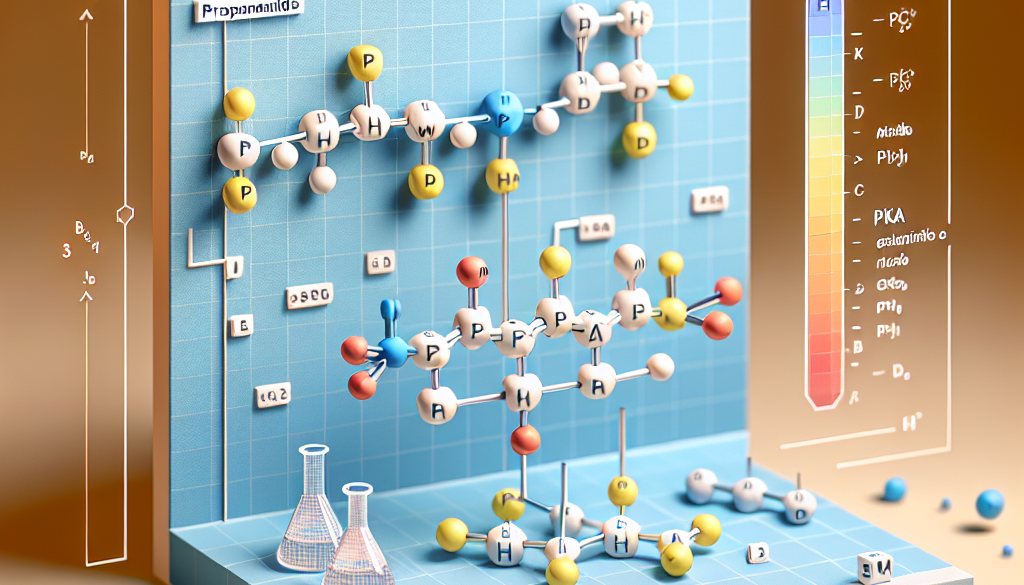Propanamide PKA: What Does This Mean for Its Chemistry?
-
Table of Contents
- Propanamide pKa: Exploring Its Chemical Significance
- Introduction to Propanamide
- Understanding pKa in Chemistry
- The pKa of Propanamide
- Chemical Properties and Reactions of Propanamide
- Hydrolysis
- Nucleophilic Substitution
- Amidation
- Applications of Propanamide in Industry
- Conclusion: The Importance of pKa in Propanamide Chemistry
- Explore ETprotein’s High-Quality Protein Products
Propanamide pKa: Exploring Its Chemical Significance
Understanding the pKa of propanamide is crucial for chemists and researchers working with this compound in various chemical and pharmaceutical applications. This article delves into what pKa means for propanamide’s chemistry, its implications in different reactions, and how it influences the behavior of this compound under various conditions.
Introduction to Propanamide
Propanamide, also known as propionamide, is an amide derived from propionic acid. It is a colorless, crystalline substance that plays a significant role in organic synthesis and various industrial applications. Before exploring the pKa of propanamide, it’s essential to understand its structure and properties.
Understanding pKa in Chemistry
The term pKa is a crucial concept in chemistry that refers to the acid dissociation constant. It measures the strength of an acid in solution, indicating how easily an acid can donate a proton. The lower the pKa value, the stronger the acid. In the context of propanamide, pKa helps in understanding its behavior as an acid or base, which is vital for predicting its reactivity and stability in different environments.
The pKa of Propanamide
Propanamide, like other amides, typically exhibits a relatively high pKa compared to carboxylic acids. This high pKa value indicates that propanamide is a weak acid and does not readily donate protons. This property influences its chemical behavior in several ways:
- Stability in neutral and basic environments
- Resistance to hydrolysis compared to esters and carboxylic acids
- Behavior in organic synthesis, particularly in nucleophilic substitution reactions
Chemical Properties and Reactions of Propanamide
Propanamide’s chemical properties are predominantly defined by its amide group. The electron-withdrawing nature of the carbonyl group increases the acidity of the amide hydrogen, albeit slightly, making it a site for chemical reactions under specific conditions.
Hydrolysis
Propanamide can undergo hydrolysis under acidic or basic conditions to form propionic acid and ammonia. This reaction is crucial in the production of propionic acid, a widely used preservative and flavoring agent.
Nucleophilic Substitution
Due to the partial positive charge on the carbon atom of the carbonyl group, propanamide can participate in nucleophilic acyl substitution reactions. This property is exploited in the synthesis of various organic compounds.
Amidation
Propanamide can act as an amine donor in amidation reactions, where it forms bonds with other carboxylic acid derivatives to produce different amides. This reaction is significant in peptide synthesis and other organic synthesis processes.
Applications of Propanamide in Industry
The unique properties of propanamide, influenced by its pKa, make it suitable for various industrial applications:
- Pharmaceuticals: Synthesis of drug intermediates and active pharmaceutical ingredients (APIs)
- Plastics and polymers: As a monomer or a polymerization agent
- Agricultural chemicals: Production of herbicides and fungicides
Conclusion: The Importance of pKa in Propanamide Chemistry
The pKa of propanamide is a fundamental aspect that influences its chemical behavior and stability. Understanding this property helps chemists manipulate propanamide for various chemical reactions and applications, from pharmaceuticals to polymers. The ability to predict how propanamide behaves in different environments based on its pKa value is invaluable in industrial chemistry.
Explore ETprotein’s High-Quality Protein Products
If you are looking for premium protein products for your nutritional needs, consider ETprotein. They offer a wide range of high-quality, organic bulk vegan proteins and nutritional ingredients that are non-GMO and allergen-free. Their products are ideal for various industries, including nutraceuticals, pharmaceuticals, and food and beverage sectors.
ETprotein is Propanamide Factory Manufacturer and Supplier in China, Check further information by visiting the Propanamide Product Page
Request Quotation and Samples of Propanamide from ETprotein
About ETprotein
ETprotein, a reputable protein and elite nutrition ingredients Propanamide Chinese factory manufacturer and supplier, is renowned for producing, stocking, exporting, and delivering the highest quality organic bulk vegan proteins and elite nutritional ingredients Propanamide. They include Organic rice protein, clear rice protein, pea protein, clear pea protein, watermelon seed protein, pumpkin seed protein, sunflower seed protein, mung bean protein, peanut protein. Their offerings, characterized by a neutral taste, non-GMO, allergen-free attributes, cater to a diverse range of industries. They serve nutraceutical, pharmaceutical, cosmeceutical, veterinary, as well as food and beverage finished product distributors, traders, and manufacturers across Europe, USA, Canada, Australia, Thailand, Japan, Korea, Brazil, and Chile, among others.
ETprotein specialization includes exporting and delivering tailor-made protein powder and finished nutritional supplements. Their extensive product range covers sectors like Food and Beverage, Sports Nutrition, Weight Management, Dietary Supplements, Health and Wellness Products, and Infant Formula, ensuring comprehensive solutions to meet all your protein needs.
As a trusted company by leading global food and beverage brands and Fortune 500 companies, ETprotein reinforces China’s reputation in the global arena. For more information or to sample their products, please contact them and email sales(at)ETprotein.com today.














